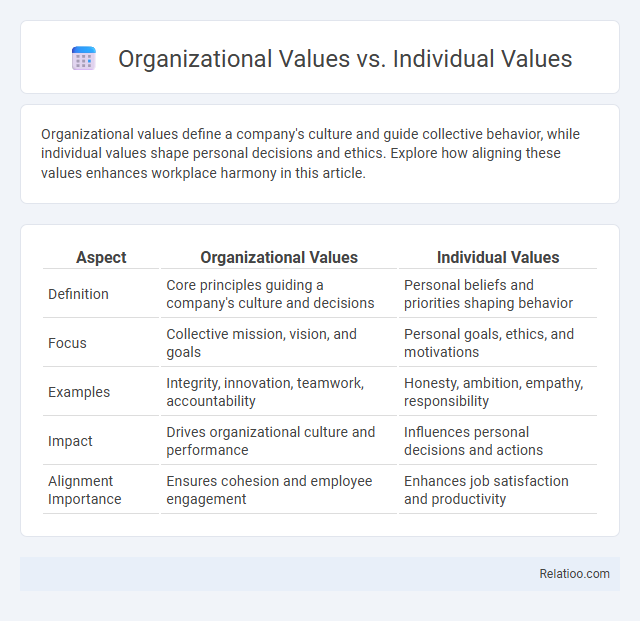Organizational values define a company's culture and guide collective behavior, while individual values shape personal decisions and ethics. Explore how aligning these values enhances workplace harmony in this article.
Table of Comparison
| Aspect | Organizational Values | Individual Values |
|---|---|---|
| Definition | Core principles guiding a company's culture and decisions | Personal beliefs and priorities shaping behavior |
| Focus | Collective mission, vision, and goals | Personal goals, ethics, and motivations |
| Examples | Integrity, innovation, teamwork, accountability | Honesty, ambition, empathy, responsibility |
| Impact | Drives organizational culture and performance | Influences personal decisions and actions |
| Alignment Importance | Ensures cohesion and employee engagement | Enhances job satisfaction and productivity |
Understanding Organizational Values
Organizational values serve as foundational principles guiding company culture, decision-making, and behavior, shaping the collective identity and strategic direction. Understanding organizational values helps align individual values, fostering cohesion, motivation, and a shared sense of purpose among employees. Clear communication and consistent reinforcement of these values ensure that the workforce acts in harmony with the organization's goals and ethical standards.
Defining Individual Values
Individual values are deeply held beliefs that guide personal behavior and decision-making, shaping how people interpret experiences and interact with others. Unlike organizational values, which align group goals and culture, individual values reflect unique priorities such as integrity, empathy, or ambition. Defining these personal values requires introspection and clarity on what principles matter most, influencing daily choices and long-term aspirations.
Key Differences Between Organizational and Individual Values
Organizational values represent the collective principles that guide a company's culture, decision-making, and behavior, emphasizing shared goals and corporate identity. Individual values, on the other hand, are personal beliefs and priorities that influence Your decisions and actions based on unique experiences and moral compass. The key differences lie in scope and purpose: organizational values aim to unify and direct a group toward common objectives, while individual values prioritize personal integrity and self-fulfillment.
The Importance of Value Alignment
Value alignment between organizational and individual values fosters a cohesive work environment that enhances employee engagement and productivity. Misalignment often leads to conflict, reduced morale, and increased turnover, impacting overall business performance. Clear guidance on shared values ensures consistent decision-making and strengthens corporate culture, driving sustainable success.
Impact of Organizational Values on Workplace Culture
Organizational values shape the workplace culture by establishing shared principles and behaviors that influence employee interactions, decision-making, and overall morale. When aligned with individual values, these organizational values create a cohesive environment that promotes trust, engagement, and productivity. Your alignment with organizational values enhances collaboration and drives a positive impact on workplace culture, fostering a sense of belonging and purpose.
Influence of Individual Values on Employee Behavior
Individual values significantly shape employee behavior by influencing decision-making, work ethic, and interpersonal interactions within the workplace. These personal beliefs often guide responses to organizational norms, potentially facilitating alignment or causing conflicts with organizational values. Understanding the dynamic between individual and organizational values enables leaders to design guidance strategies that promote a cohesive culture and enhance overall performance.
Navigating Value Conflicts in the Workplace
Organizational values provide a framework for company culture and decision-making, while individual values reflect personal beliefs shaped by unique experiences. Navigating value conflicts in the workplace requires clear communication, empathy, and alignment strategies to reconcile differences without compromising core principles. Guidance from leaders and HR policies is critical to fostering an environment where diverse values coexist and contribute to organizational success.
Strategies for Aligning Organizational and Individual Values
Strategies for aligning organizational and individual values involve clear communication of core principles, fostering a culture of transparency, and encouraging employee participation in decision-making processes. Implementing regular training sessions and feedback loops ensures that personal values resonate with organizational goals, promoting unified commitment and ethical behavior. Utilizing values assessments during recruitment and performance evaluation helps match individuals whose values align closely with the company's mission, enhancing overall engagement and productivity.
Benefits of Value Congruence in Organizations
Value congruence between organizational values and individual values enhances employee commitment, job satisfaction, and overall performance by fostering a unified work environment. Alignment of values reduces workplace conflicts, improves communication, and strengthens trust among team members, leading to higher retention rates and organizational loyalty. Clear guidance that reflects shared values supports ethical decision-making and promotes a positive corporate culture, driving sustained business success.
Adapting Values in a Changing Work Environment
Adapting values in a changing work environment requires aligning organizational values with evolving individual values to foster a cohesive culture that supports innovation and resilience. Guidance from leadership plays a critical role in integrating diverse personal values into the organizational framework, ensuring adaptability without compromising core principles. Emphasizing open communication and continuous feedback helps bridge gaps between personal beliefs and organizational expectations, enhancing employee engagement and overall performance.

Infographic: Organizational Values vs Individual Values
 relatioo.com
relatioo.com